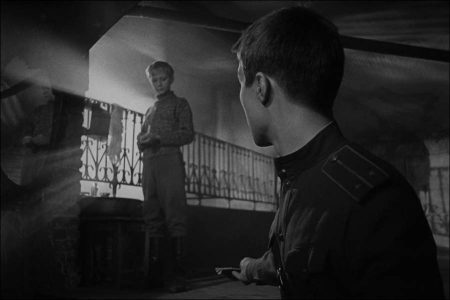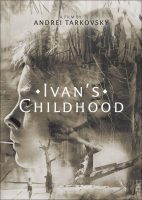My Name is Ivan movie storyline. It’s the middle of WWII in Russia. Orphaned pre-teen Ivan Bondarev does reconnaissance work for the military. He is able to get through small cracks where adults could not, both because of his small physical size and the fact that no one would suspect a boy of doing such work. Despite his tough exterior, he often dreams about happy situations with his mother, who, along with his sister, was exterminated in a concentration camp.
Those dreams usually end violently. After Ivan obtains some information concerning an advancing German troop, his commanding officer, Lieutenant Colonel Gryaznov, wants to send him to military school as he believes the offensive is no place for a boy. Ivan vows to run away and join the partisans in their work if he is sent away. After an attempt to run away, Ivan is allowed to stay and continue his reconnaissance work during the offensive.
Ivan’s stay is not the only one questioned, but also Masha’s, a female medical officer who some believe is not mentally or physically strong enough to endure the horrors of the front lines of war, while others romantically yearn for her. Regardless, Ivan’s colleagues and superiors, many who view him as a son, openly ponder his life post-war, that is if he and they make it out alive.
My Name Is Ivan (Russian: Ivanovo Detstvo), is a 1962 Soviet war drama film and the first feature film directed by Andrei Tarkovsky. Co-written by Mikhail Papava and an uncredited Tarkovsky, it is based on Vladimir Bogomolov’s 1957 short story Ivan (Russian: Иван).The film features child actor Nikolai Burlyayev along with Valentin Zubkov, Evgeny Zharikov, Stepan Krylov, Nikolai Grinko, and Tarkovsky’s wife Irma Raush.
Ivan’s Childhood tells the story of orphaned boy Ivan, whose parents were killed by the invading German forces, and his experiences during World War II. Ivan’s Childhood was one of several Soviet films of its period, such as The Cranes Are Flying and Ballad of a Soldier, that looked at the human cost of war and did not glorify the war experience as did films produced before the Khrushchev Thaw. In a 1962 interview, Tarkovsky stated that in making the film he wanted to “convey all [his] hatred of war”, and that he chose childhood “because it is what contrasts most with war.”
Ivan’s Childhood was Tarkovsky’s first feature film. It won him critical acclaim and made him internationally known. It won the Golden Lion at the Venice Film Festival in 1962 and the Golden Gate Award at the San Francisco International Film Festival in 1962. The film was also selected as the Soviet entry for the Best Foreign Language Film at the 36th Academy Awards, but was not accepted as a nominee. Famous filmmakers such as Ingmar Bergman, Sergei Parajanov and Krzysztof Kieślowski praised the film and cited it as an influence on their work.
About the Production
Ivan’s Childhood was Tarkovsky’s first feature film, shot two years after his diploma film The Steamroller and the Violin. The film is based on the 1957 short story Ivan (Russian: Иван) by Vladimir Bogomolov, which was translated into more than twenty languages. It drew the attention of the screenwriter Mikhail Papava, who changed the story line and made Ivan more of a hero.
Papava called his screenplay Second Life (Russian: Вторая жизнь, Vtoraya Zhizn). In this screenplay Ivan is not executed, but sent to the concentration camp Majdanek, from where he is freed by the advancing Soviet army. The final scene of this screenplay shows Ivan meeting one of the officers of the army unit in a train compartment. Bogomolov, unsatisfied with this ending, intervened and the screenplay was changed to reflect the source material.
Mosfilm gave the screenplay to the young film director Eduard Abalov. Shooting was aborted and the film project was terminated in December 1960, since the first version of the film drew heavy criticism from the arts council, and the quality was deemed unsatisfactory and unusable. In June 1961 the film project was given to Tarkovsky, who had applied for it after being told about Ivan’s Childhood by cinematographer Vadim Yusov. Work on the film resumed in the same month. The film was shot for the most part near Kanev at the Dnieper River.
Tarkovsky continued his collaboration with cinematographer Vadim Yusov, who was the cameraman in Tarkovsky’s diploma film The Steamroller and the Violin. Nikolai Burlyayev had played a role in Andrei Konchalovsky’s student film The Boy and the Pigeon. Konchalovsky was a friend and fellow student of Tarkovsky at the State Institute of Cinematography (VGIK), and thus Burlyayev was also cast for the role of Ivan. He had to pass several screen tests, but according to Burlyayev it is unclear whether anyone else auditioned for the role.[7] Burlyayev would later play Boriska in Tarkovsky’s second feature, Andrei Rublev.
My Name is Ivan (1962)
Directed by: Andrei Tarkovsky
Starring: Nikolai Burlyaev, Valentin Zubkov, Evgeny Zharikov, Stepan Krylov, Nikolai Grinko, Vera Miturich, Valentina Malyavina, Irma Raush, Andrei Konchalovskiy, Irina Tarkovskaya
Screenplay by: Vladimir Bogomolov, Mikhail Papava, Andrei Tarkovsky
Production Design by: Evgeniy Chernyaev
Cinematography by: Vadim Yusov
Film Editing by: Lyudmila Feiginova
Makeup Department: Lyudmila Baskakova
Music by: Vyacheslav Ovchinnikov
MPAA Rating: None.
Distributed by: Shore International
Release Date: April 6, 1962
Visits: 210

